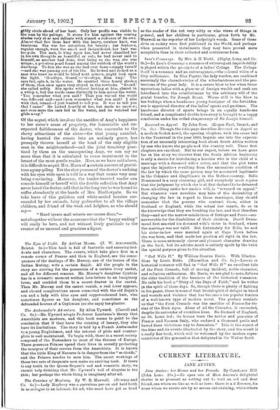Reversed on Appeal. By John Ross. (liegan Paul, Trench, and
Co. Cs.) -Though the title-page describes Reversed on Appeal as a modern Scotch novel, the opening chapters, with the scene laid in the Transvaal in the year 18SO, beguile one into the expecta- tion of an unusually interesting book about South Africa written by one who knows the people and the country well. These first chapters are excellent. But to our regret, before we have gone far in the story we discover that the South African beginning is only a device for introducing a heroine who is the child of a marriage with a deceased wife's sister, and that the plot turns upon the injustices resulting from the anomalous condition of the law by which the same person may be accounted legitimate in the Colonies and illegitimate in the Mother-country. Belle Drummond is a very charming girl, and everybody must rejoice that the judgment by which she is at first declared to be debarred from inheriting under her uncle's will, is "reversed on appeal." But whatever view novelists may take of the desirability of changing the law in regard to these marriages, they should remember that the persons who contract them, either in Scotland or England, while the actual law stands, do so in the knowledge that they are breaking the law, and that therefore they—and not the narrow-mindedness of Bishops and Peers—are answerable for the disabilities of their children. David Drum- mond first married his deceased wife's sister in Scotland, where the marriage was not valid. But fortunately for Bello, he and his sister-in-law were married again at Cape Town before she was born, and that made her position all right in the law. There is some extremely clever and pleasant character drawing in the book, but its artistic merit is entirely spoilt by the twist the special purpose gives to the situation.






































 Previous page
Previous page